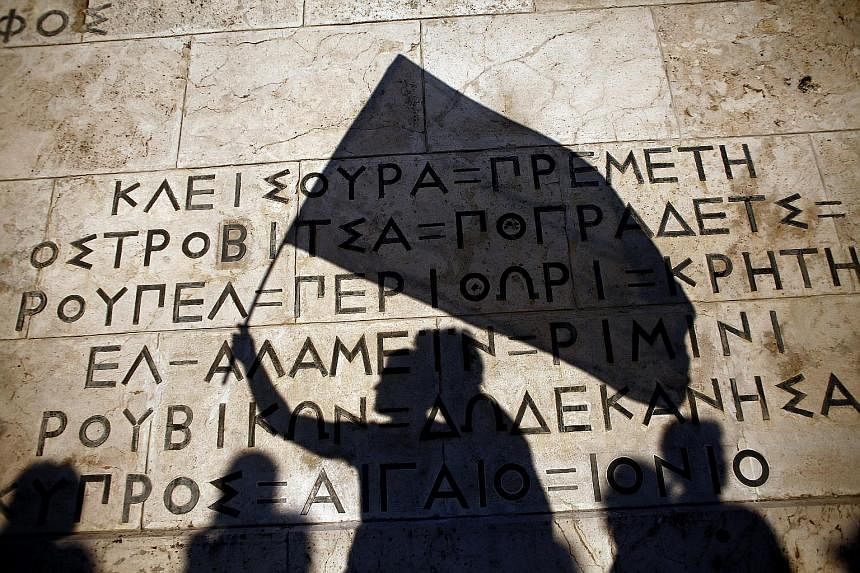EUROPEAN Union finance ministers claim to be optimistic that, when they convene later today in an emergency session, they will succeed in reaching a deal to avert Greece's bankruptcy and potentially catastrophic eviction from the euro currency zone.
In theory, the prospects of a deal have seldom been brighter. Although EU heads of state and government failed to reach an agreement on Greece at a special summit held for this purpose earlier this week, the Greek proposal to cut government expenditure in exchange for receiving new loans is now hailed as a prelude to a positive decision when European leaders meet again for another summit tomorrow and on Friday.
"The basis of a deal has been assembled," French President Francois Hollande has claimed.
Still, German Chancellor Angela Merkel, whose support is crucial to the disbursement of any fresh European cash, continues to strike a note of caution.
"A lot of work still needs to be done and time is very short," she told German media. The key obstacle to a deal is not so much what Greece promises to do, but the level of trust which other European leaders should place on the latest Greek promises.
Greek Prime Minister Alexis Tsipras, whose far-left government came to power in January vowing to tear up all previous economic austerity policies, has made no fewer than five previous economic reform proposals, all supposedly designed to put his country's finances in order.
Yet all of them were dismissed as being vague about what the country should do in return for getting fresh credits to service its debts. "Too many words, and far too few figures" is how Mr Jeroen Dijsselbloem, the Dutch Finance Minister who presides over these talks, once put it. But not this time, for Mr Dijsselbloem characterised the latest Greek plan as "broad and comprehensive".
On paper, the Greeks have dropped their opposition to the demands imposed upon them by international creditors.
Mr Tsipras has promised to raise income taxes and impose sales taxes on a variety of goods and services which are currently exempt. Even politically sensitive demands for cuts in Greek pension payments, which Mr Tsipras previously dismissed as "unthinkable", have been accepted: An extra payment granted to the poorest pensioners will be phased out by the end of this decade.
The Greek government claims that, when taken together, these measures will account for an overall saving of 1 per cent of Greece's gross domestic product starting from next year. That would bring the government in Athens close to the target demanded by its creditors, and could potentially unlock the cash Greece needs to avert a default on a €1.6 billion (S$2.4 billion) loan repayment due next week.
The snag is that the Greek proposals concentrate too much on raising revenues, and too little on cutting expenditure, which is the country's biggest problem. Greece is already one of the most heavily taxed nations on the continent; its difficulty is that it cannot collect its taxes, a topic on which the current Greek plan is silent.
Yet a far bigger problem for Europe is that of trust in Greece's good faith. The proposals tabled this week could have been tabled months ago and averted the current crisis. They were held back until the very last moment largely because Mr Tsipras gambled that the threat of his country's default would scare Europe into giving him the cash without preconditions.
And although the Greek government now seems to have caved in to European demands, it has not lost its knack of playing mind games on its creditors. The only reason that EU finance ministers have to meet today is that the Greeks failed to provide their plan well in advance, as required.
Whether Greece gets a financial lifeline this week will ultimately depend less on what its leaders promise to do, and more on the balance of power inside the German government.
While Dr Merkel wants to avoid Greece's eviction from the euro zone, her hardline Finance Minister Wolfgang Schaeuble is willing to contemplate its departure, and has already called on Greece to impose capital controls to avoid a meltdown of its financial system.
The latest offer may have provided Dr Merkel with an honourable way out of the impasse, without appearing to have caved in to Greece's obdurate behaviour.
On one point, however, all Europeans privately agree: Whatever deal they put in place this week is unlikely to last for too long, for the Greek begging bowl will return to haunt the continent.

